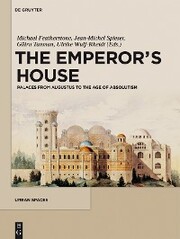Detailansicht
The Emperor's House
E-Book
Format: EPUB
DRM: Adobe DRM
- Zusatztext
-
Evolving from a patriciandomus, the emperor's residence on the Palatine became the centre of the state administration. Elaborate ceremonial regulated access to the imperial family, creating a system of privilege which strengthened the centralised power. Constantine followed the same model in his new capital, under a Christian veneer. The divine attributes of the imperial office were refashioned, with the emperor as God's representative. The palace was an imitation of heaven.
Following the loss of the empire in the West and the Near East, the Palace in Constantinople was preserved subject to the transition from Late Antique to Mediaeval conditions until the Fourth Crusade, attracting the attention of Visgothic, Lombard, Merovingian, Carolingian, Norman and Muslim rulers. Renaissance princes later drew inspiration for their residences directly from ancient ruins and Roman literature, but there was also contact with the Late Byzantine court. Finally, in the age of Absolutism the palace became again an instrument of power in vast centralised states, with renewed interest in Roman and Byzantine ceremonial.
Spanning the broadest chronological and geographical limits of the Roman imperial tradition, from the Principate to the Ottoman empire, the papers in the volume treat various aspects of palace architecture, art and ceremonial.
-
- Kurztext
-
URBS is the first international series to provide the fields of classical archaeology and architectural history with a specialized forum for the discussion of current questions in urban studies. Its goal is to bring architectural and urban analyses into productive dialogue with the sociology of space. The study of classical antiquity is central to the series, but so are its predecessors and neighboring cultures, as well as the receptions of Greece and Rome in Late Antiquity, the Islamic world, the medieval West, and the modern era.
-
- Autorenportrait
-
M. Featherstone, Paris/Fribourg;J.-M. Spieser, Fribourg;G. Tanman,Istanbul;U. Wulf-Rheidt, Berlin
-
